Prague citizens will not lose their traditional way of celebrating the arrival of the new year!
The spectacular fireworks show will light up the sky above the Czech capital on January 1st. Further details will be available in early December. The organizers of last year’s fireworks decided together with the association Ohňostroj pro Prahu that they wanted to preserve this tradition for several decades, and at the same time, there will be a campaign ‘I WILL NOT SHOOT’ to prevent uncontrolled amateur firing of pyrotechnics.
“Fireworks have been, are and will be,” says Martin Peter, designer, and choreographer of the last five years fireworks in Prague.” Already during the time of Rudolf II, we were a real European cradle of fireworks, and Prague fireworks have been connecting people for many decades across history,” adds Peter.
According to his words, he does not want to let the popular cultural entertainment disappear only from the whims of the current leadership of Prague, which identifies with the unilateral views of environmental activists. “I get hundreds of questions about this year’s fireworks, and it was the support of our fans and citizens of Prague and the Czech Republic that made me try to save New Year’s fireworks,” says Peter.
Historically, fireworks have been fired from Letna Park, Vitkov, Petrin or the Vltava River, attracting hundreds of thousands of spectators and tourists. The Prague Fireworks and their organization were financed in previous years in cooperation with the Prague City Hall. For the first time, however, everything will be different, according to the director of the Fireworks association in Prague, Jan Šaršoun.
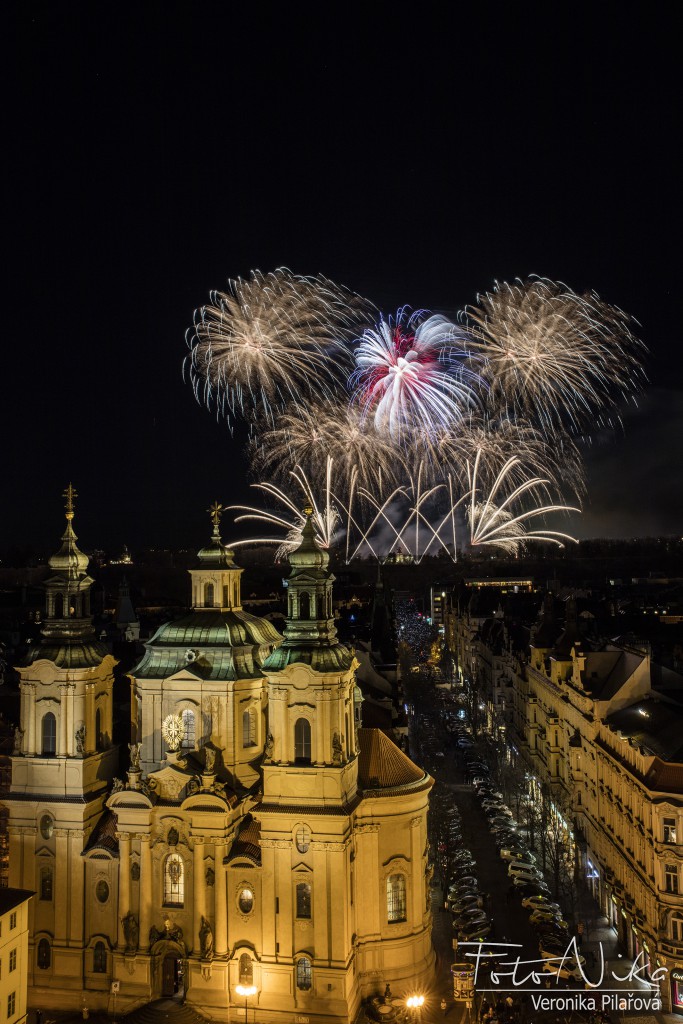
Photo: Veronika Pilařová
“As a fan of New Year’s fireworks, I founded a movement to preserve our cultural traditions, and by this action, I would like to give every citizen the feeling that Prague belongs to the people themselves,” explains Šaršoun. “I believe that people are interested in fireworks, so we leave the financing to their will. Every citizen of Prague, Czech citizen or organization can contribute to our transparent account with any amount and help save a part of our country’s culture.”
This gesture will show if citizens are interested in New Year’s fireworks. “We welcome any support from the public, and we want to thank you in advance for it,” says Šaršoun. “We would like to call on Prague citizens and residents of the Czech Republic to reduce the uncontrolled and dangerous form of firing pyrotechnics in the streets, in the spirit of the campaign I WILL NOT SHOOT, which we are also organizing in the framework of this event.”
“Public support and a commitment to tradition is our driving force. When preparing this year’s event, we proceeded according to legislative options and the only thing that can stop us is the bad weather,” observes Peter with a smile.
The exact location, size of the fireworks, details and its theme will be revealed at the beginning of December. Each citizen has the opportunity to comment and contribute through the website ohnostrojproprahu.cz, where it will be published current information on the upcoming event.
A hundred-year-old weather column, on the corner of Buzulucká Street and Vítězné náměstí in Dejvice, has been restored. It is one of the few surviving columns in Prague.
There were over fifty of them all over the Czech Republic. Another one is located on the pavement next to the Masaryk Railway Station.
One has also been in the Hadovka Dejvice park for several years, and after an agreement with the authorities it was installed there a few years ago by architect Jan Trejbal. Before that, he bought it for 1200 CZK, where the technical monument originally stood.
Meteorological columns have been produced since the second half of the 19th century, and at the beginning of the 20th century the setting in villages, larger villages, and towns became the fashion. The columns were used for weather forecasting plus showing time.
After World War II, the advent of more modern technologies halted the development of these weather stations. Eventually, most of them gradually deteriorated and in many places had them removed completely.
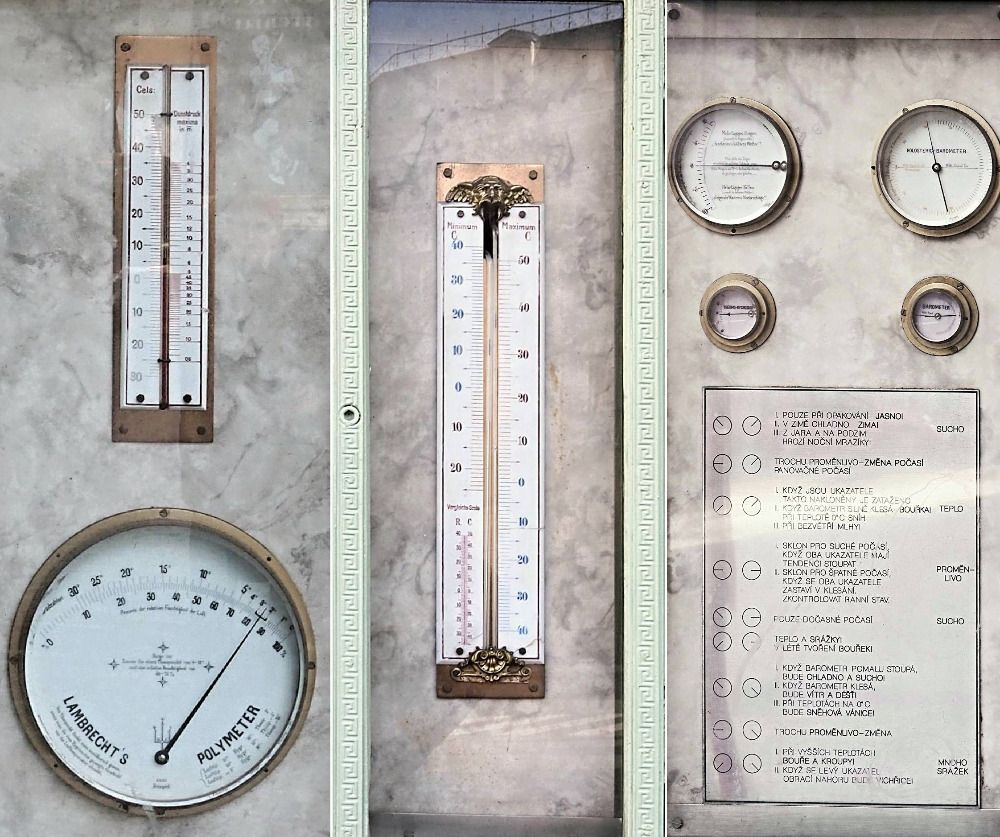
A 1914 technical monument remains on the outskirts of Kulaťák, but in a dysfunctional state. Some time ago, the Czech National Trust (CNT)—a non-profit organization—decided to save this meteorological column in Dejvice.
The reconstruction project was sponsored by Penta Real Estate and the Prague 6 City District. The artificial stone was cleaned and repaired. The locksmiths created new metal parts and the column was fitted with replicas of metrological instruments. On the corner of Buzulucka and Vítězné náměstí, people can learn temperature, humidity or air pressure.
“In the next phase, it will be fitted with an electronic display, which will provide additional supplementary data on both the columns and current air measurements from the Meteorological Institute, such as air pollution. It will complement the data provided by analogue devices,” said Jakub Stárek (ODS), Deputy Mayor of Prague 6.
The renewed post welcomes the revitalization of the area as a suitable revival. One may also find it interesting to compare traditional and modern technologies in the field of meteorology. The city district will take over the post in agreement with the CNT. The district had already painted it with antigraffiti paint from their resources.
“We considered installing touch screens with some practical applications on it, such as in the Town Hall building, but we abandoned the intention. [However], the place is not so busy,” added the deputy mayor.

Photo: Jan Puci
Not only for schoolchildren is September a symbol of new beginnings. This time we will introduce businesses that opened their doors in September, so there is something to look forward to. Whether you are a fan of good beer, quality burgers, or steaks, one thing is sure: in this edition of newly opened businesses, you will find yours.
Long-awaited newcomer to Prague, especially for fans of good beer, unique space, and great food. What can you experience? Everything in Červený Jelen is subordinate to take good care of an exclusive Pilsner beer, which is unpasteurized in the tank. It is brought by a special tank directly from the brewery and is the freshest possible beer to taste. The beer stretches to the bar in the shortest way possible, and with the perfect temperature ensured.
Červený Jelen is also unique in its space, which used to be a Baroque palace with a beautiful garden. It symbolizes the return of a calm life to the centre of Prague. Therefore, you will find an interior from the architect team of Stanislava Fialy with many cubist details that follow the work of architect Josefa Gočára.
Address: Hybernská 5, Prague
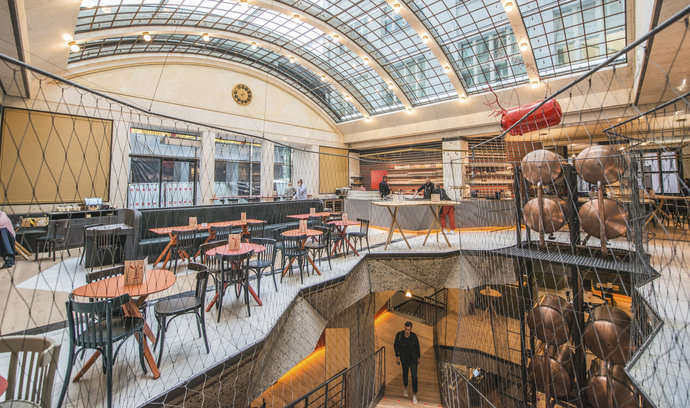
There are probably a few of you who do not know the renowned Prague burger Dish. The good news is that the company opened a second one in September. What will the new business offer, and where can you find it? The new establishment is located only a short distance far away from the first Dish, in Belgická Street. The restaurant offers an extended non-vegetarian menu, more seating and of course their famous burgers. Open from 11 a.m. to 11 p.m. Monday to Sunday.
Address: Belgická 26, Prague
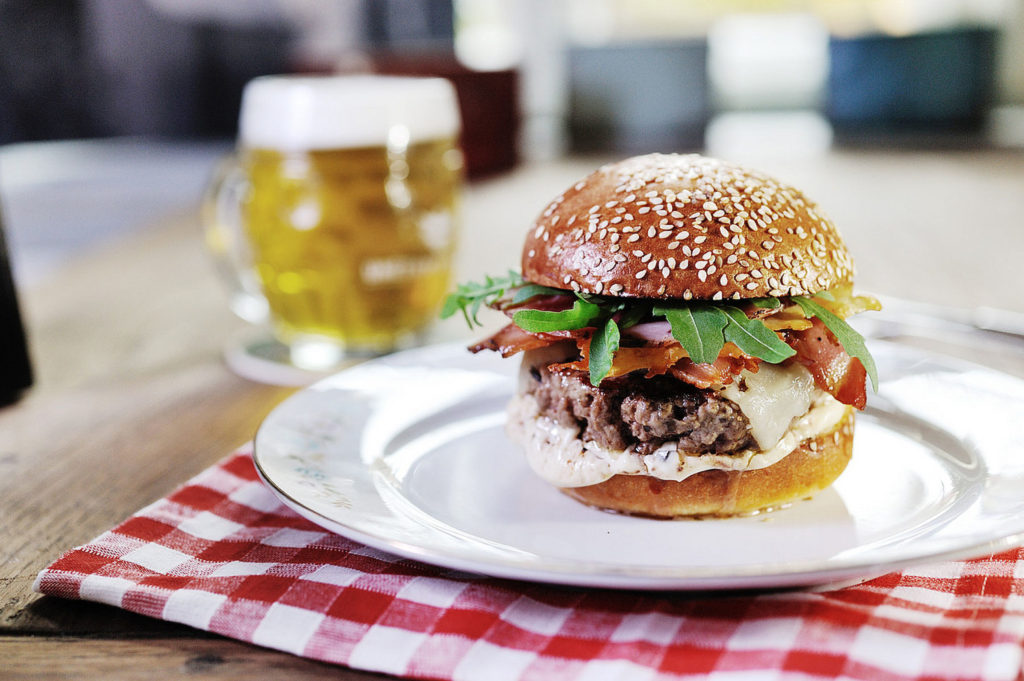
We will continue with meat and new places of well-known businesses. Not long ago, the Meat Vandals concept settled directly below the Kotva department store. They decided to expand and open a bistro in Myslikova Street. Still, you can look forward to their excellent pulled pork, jerky beef, and famous pastrami.
Address: Myslíkova 29, Prague

Sunday was the warmest October 13th ever recorded at Prague’s Klementinum, the oldest Czech monitoring station. The temperature reached 23.3 degrees Celsius, a tenth of a degree more than 1791.
Seventeen monitoring stations in the Czech Republic exceeded 25 degrees Celsius.
Four other stations (Klatovy, České Budějovice-Rožnov, Tábor-Měšice, and Milešovka), set a new record in the last 100 years.
The hottest temperature was recorded in Neumětely (Central Bohemia) and Husinec (South Bohemia), with 26.4 degrees Celsius.
Temperatures may rise above 20 degrees at the beginning of next week, then cool down slightly.
The summer weather was typical of the western half of the country on Sunday as well as on Saturday, while in the highlands, Moravia and Silesia regions, they had a rather cold weekend due to fog and low clouds.
June 30th was the warmest day ever recorded at Prague’s Klementinum. The temperature reached 37.9 degrees Celsius, the highest since measurements began in 1775.
The Czech branch of Extinction Rebellion held a peaceful demonstration with a traffic blockade, intending to call attention to the climate crisis. The blockade lasted 40 minutes.
Dozens of campaigners demanded climate change policy reform from the Czech government. Around 100 protesters laid down on the pedestrian crossing by the National Museum.
“There is a climate and ecological crisis,” national coordinator of Extinction Rebellion in the Czech Republic Kate Wiseman says. “And governments of the world, which have the power to legislate and stop the worst impacts of this crisis, are not doing enough.”
The impact of global warming on the Czech Republic has been manifested by six consecutive years of drought and deforestation at an alarming rate.
“30 percent of Czech forests are gone,” Wiseman says. “I know people can say ‘bark beetles are destroying the forests’, but climate change makes the bark beetle problem much worse in two ways: firstly, bark beetles reproduce more frequently because it is not cold enough in winter anymore; secondly, trees cannot fight bark beetles because of drought: they do not get enough water from the soil.”
Describing itself as an international “non-violent civil disobedience activist movement”, Extinction Rebellion (abbreviated as XR) has three demands:
-
- Tell the truth: The movement wants the Czech government, media and schools to inform the public about the seriousness of the extreme weather caused by heating. The biggest thing XR wants under this demand is the Czech Republic to declare the climate and ecological emergency. “After the April protest in London, the United Kingdom declared the climate emergency,” Wiseman says. “We are a bit behind here in the Czech Republic with regards to “Tell the truth” demand. The Czech Republic along with Poland, Hungary, and Estonia refused to adapt the EU climate neutrality target at the summit in Brussels on June 20, 2019, as the Guardian
-
- Act now: XR demands the Czech Republic to become carbon neutral by 2025. “It is challenging but possible,” Wiseman states. “We are going to have a different life, but it is a lot better than what is coming if we do absolutely nothing.”
-
- Beyond politics: The movement believes the democracy is broken on a matter of climate and ecological crisis. XR suggests creating a Citizens’ Assembly on climate and ecological justice. It is a form of more direct democracy, under which Czech citizens will decide how to go carbon neutral by 2025. “As a movement, we do not propose solutions,” Wiseman explains. “Our job is to allow people to choose solutions through a democratic process that has delivered progressive results on difficult political problems like the Irish abortion referendum.”
Extinction Rebellion activists are subject to criticism and harassment in many countries, including the Czech Republic. Jiří Ovčáček, a spokesman for President Miloš Zeman, compared the extinction symbol, a stylized hourglass within a circle, to the Nazi swastika, as Wiseman says. Former Prime Minister of the Czech Republic Mirek Topolánek tweeted: “I request that the Extinction Rebellion be included in the list of potential terrorist organizations.”
Žádám, aby Extincion Rebellion byla zařazena na seznam potenciálně teroristických organizací. Co udělají poté, až šíření poplašných zpráv, nezákonné blokády a nátlakové akce nezaberou. Budou se radikalizovat jako Antifa? Nebo jako Rote Armee Fraction?https://t.co/OGpnPbZnIH
— Mirek Topolánek (@MirekTopolanek) October 5, 2019
“Even though we are much smaller than in the UK and have not had a direct response from Babiš or Zeman, we are still getting the same kind of response from the people who represent the system that needs to be changed,” Wiseman says.
Prague joined the second period of the International Climate Rebellion, started on October 7 in London, Paris, Berlin, New York and 60 other cities (where Extinction Rebellion is present) across the world. Formed in April 2018 in the United Kingdom, Extinction Rebellion has expanded to now include 340 groups in 72 countries.
Hundreds of protesters around the world have been arrested during the climate strike. The Guardian reports that almost 1,300 arrests of Extinction Rebellion have been made since Monday in the UK. The Prague police removed protesters from the road individually and checked their IDs, but the mood remained peaceful. About 20 rebels, who were involved in road blocking on Friday, have been taken to a police station for a repeated minor offense.
By the demonstration with a traffic block, the movement also wants to inspire Czechs who are worried about the climate crisis but feel that they cannot do anything about it. “We hope to do something loud enough to reach those Czechs and give them courage and confidence to create change on this matter,” Wiseman says.
Eyewitnesses of the demonstration share differing opinions on the activists.
“I feel sorry for policemen who have to deal with those clowns,” says a tourist from Russia Vladislav. “By blocking the road, you are just wasting everybody’s time.”
“I think blocking oxygen is more important,” interrupts Lucinka, a student from Prague. “Not to be shady, but we are going to die if we do not do something.”

Photo: Temir Asanov for Prague Morning

Photo: Temir Asanov for Prague Morning

Photo: Temir Asanov for Prague Morning

Photo: Temir Asanov for Prague Morning
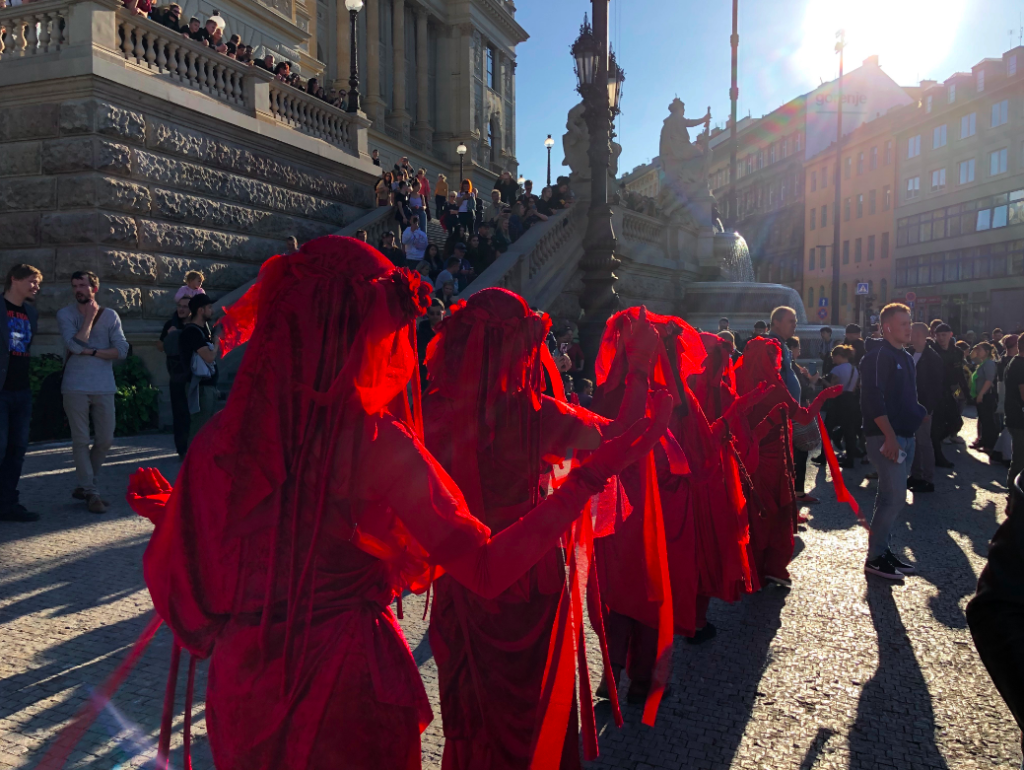
Photo: Temir Asanov for Prague Morning

Photo: Temir Asanov for Prague Morning
The funeral of Karel Gott took place today (Saturday, October 12th) at St. Vitus Cathedral in Prague Castle. Cardinal Dominik Duka officiated over the mass.
There were more than two hundred invited guests.
President Miloš Zeman, PM Andrej Babiš (ANO), Senate chairman Jaroslav Kubera (ODS) attended the funeral.
Gott released some 300 albums starting in the 1960s and sold tens of millions of copies in his country, the Soviet Union and elsewhere in the Communist world.
He rose to stardom in the 1960s touring the US and what was then West Germany and represented Austria in the Eurovision song contest.
That was when German papers described him as the “Sinatra of the East”.
Karel Gott died on October 1st at the age of 80, succumbing to acute leukemia. A first cancer on the lymphatic system, he had survived a few years earlier.
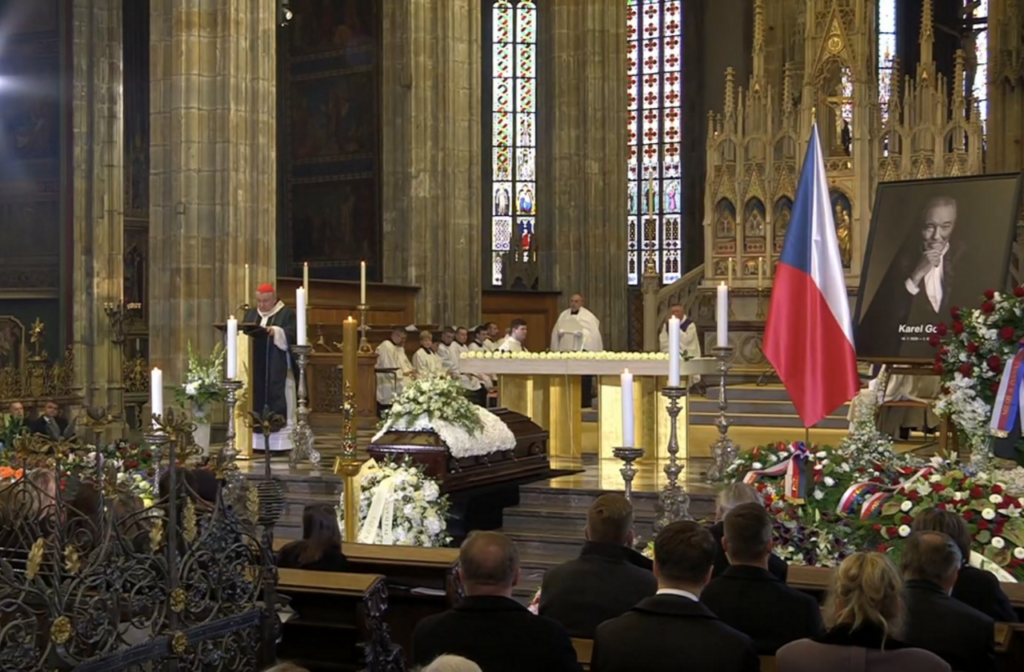
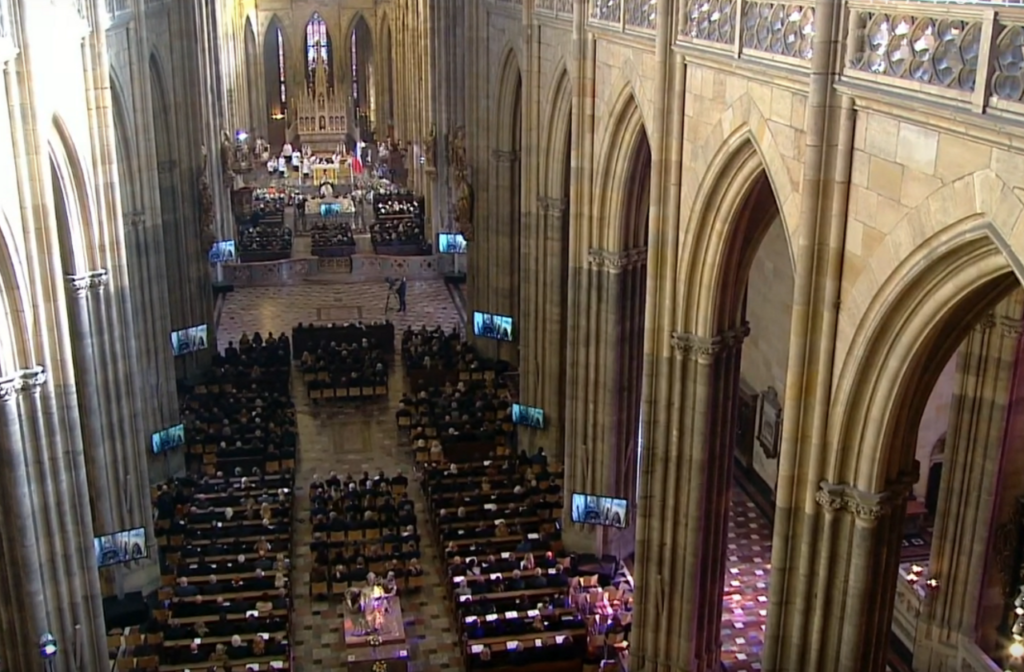
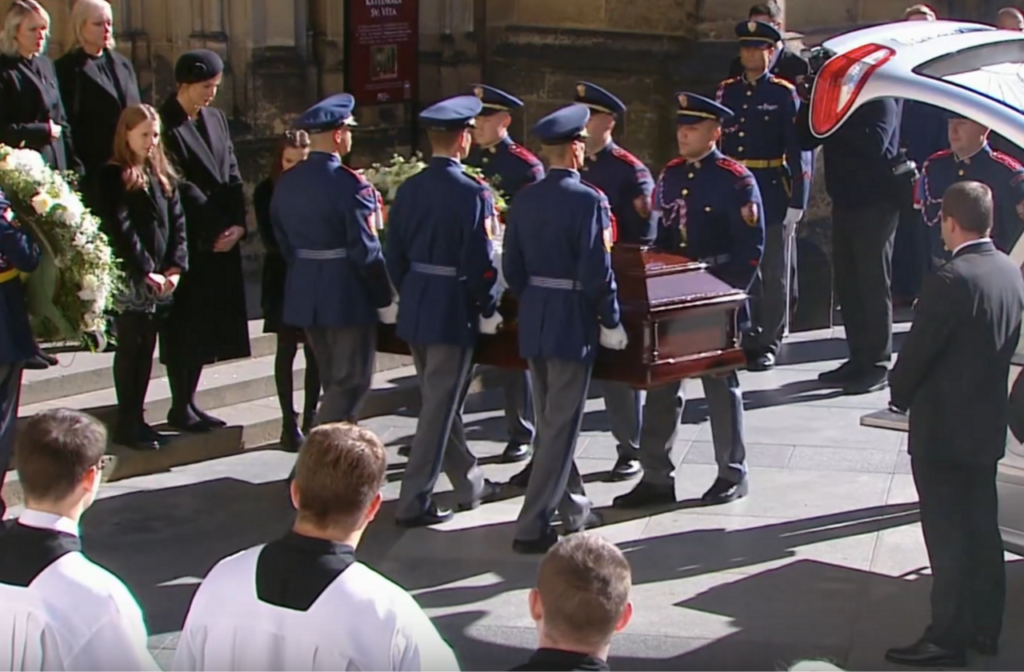
This weekend the eighth year of the Prague Coffee Festival will take place in Holešovice.
It is the biggest coffee festival in the Czech Republic where professionals from the world of coffee, as well as enthusiasts from the general public, regularly meet.
The festival will also offer a variety of refreshments from both salty and sweet bakery products and pancakes, home-made cheesecakes, and doughnuts to hamburgers and Asian or vegan specialities. The music scene will be taken care of by DJ Pocoloco (Cabaret Manana).
Recently a lot of attention has been paid to coffee, particularly to specialty coffee and to new brewing techniques which have even become popular among the general public. The festival weekend will be filled with tastings, coffee shop and roastery presentations, workshops, lectures, and a music program.
During both days, several lectures led mostly by foreign guests from the world of coffee will take place. These include:
- Dr. Samo Smrke, who works at the University of Applied Science in Zurich, in the department of Coffee Competence Centre and Analytical Technologies;
- Martin Hudák, the World Champion in the Coffee in Good Spirits competition, who will speak on the coffee cocktails of the future;
- Gwilym Davies, an internationally known jury member in coffee competitions and tutor, who will present the basics of coffee to the visitors;
- Veronika Tázlerová, a blogger and author of Prague Coffee Guide and the map of cafés, who will give you advice on how to simply take photos and arrange (not only) coffee to be put on Instagram, and how to use this social network effectively for marketing presentation of a café or roastery.
You can buy the tickets for the festival in electronic form at coffeefest.cz.
A one-day ticket costs CZK 399 and includes the unlimited degustation of coffee at the festival and, at the same time, the entry to the lectures, workshops, and cuppings. The entrance fee includes also the map of Prague cafés, containing all businesses from all the existing editions of Book of Cafés, to be received by the visitors at the venue.
The Prague Coffee Festival is organized by the Coffee Embassy association whose mission is to promote coffee culture and raise public awareness about coffee, coffee growers and processors, and new trends. The Prague Coffee Festival was established in 2012 by a team of the mamacoffee roastery
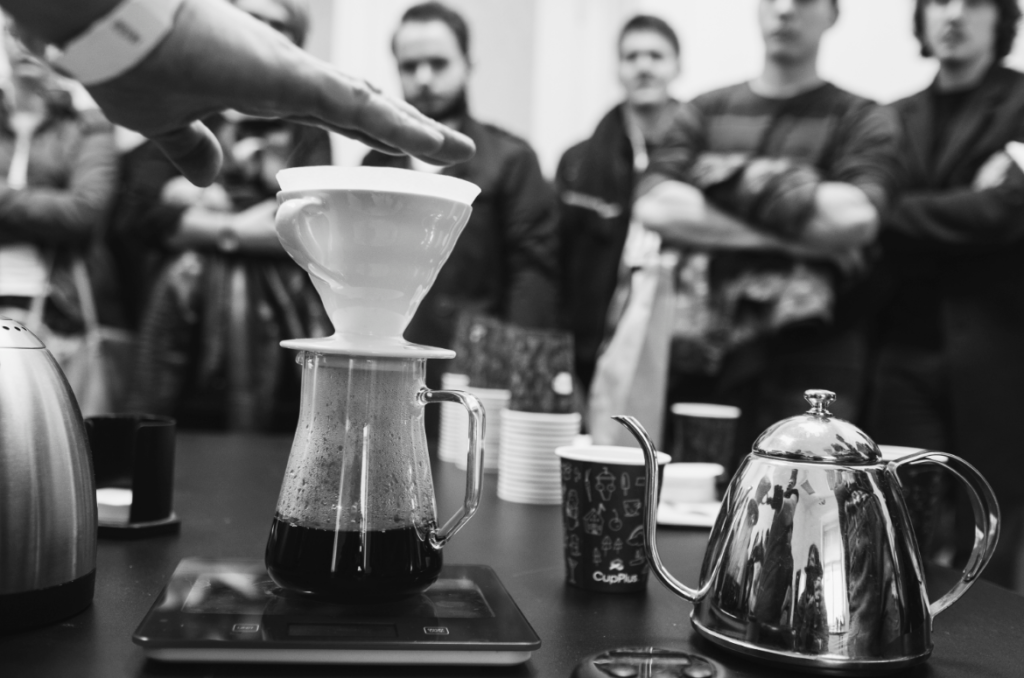

The Czech football team on Friday evening handed England their first major tournament qualifier defeat since 2009, by a score of 2:1 in the 2020 European Championship contest.
It was the first victory for the Czech Republic over England since Czechoslovakia split in 1993. Czechoslovakia last beat England 2-1 in 1975 in a qualifying game for the following year’s European Championship which Czechoslovakia went on to win.
England was able to register an early goal. Skipper Harry Kane converted the penalty in the fifth minute to give the Three Lions a 1-0 lead.
Raheem Sterling’s run was ended by Lukas Masopust’s clumsy trip and as a result, England was awarded a penalty.
The Czech Republic did not have to wait a long time for the equalizing goal as Jakub Brabec netted the ball in the 9th minute, bringing the scoreline to 1-1.
Zdenek Ondrášek defied the odds and registered a goal for the Czech Republic in the 85th minute to give the side a 2-1 lead.
“It’s unbelievable,” the 30-year-old Ondrášek said. “I’m happy to get a chance (to play) and that I used it. It’s a very important victory and I’m grateful for it. It was hard work from the entire team.”
Level at 1-1 after a sloppy performance, England were punished by 30-year-old Czech debutant and substitute Zdenek Ondrášek, who converted low and unmarked from 10 yards to stun Gareth Southgate’s side (85).
A win would have sent England to Euro 2020, but defeat means England and the Czech Republic are level on points at the top of Group A, with Kosovo four points behind.
England must wait to confirm their place in Euro 2020 after the Czech Republic deservedly ended their 43-game unbeaten run in qualifiers stretching back 10 years.
England can still qualify on Monday if they beat Bulgaria and Kosovo do not beat Montenegro.
A famous night in Prague for the Czech Republic ???#EURO2020 pic.twitter.com/VpupcJmTN0
— UEFA EURO 2020 (@UEFAEURO) October 11, 2019
The Prague International Food Festival starts tomorrow in Zlute Lazne.
This is your opportunity to try various foods from different parts of the world. In one moment you may have some delicious grilled ribs in your hands and in another some Pad Thai from Asia.
Right when the doors open (at 10 am) music will start from the DJ, who will play a mix of International Songs.
The day will continue with various live shows throughout. The main concert will be the Elvis Presley Cover Band which has toured all around the Czech Republic as well as Europe.
They will start around 16:30/ 17:00 so be sure you are at the festival by then.
The weather looks great, so Praguemorning will see you there!
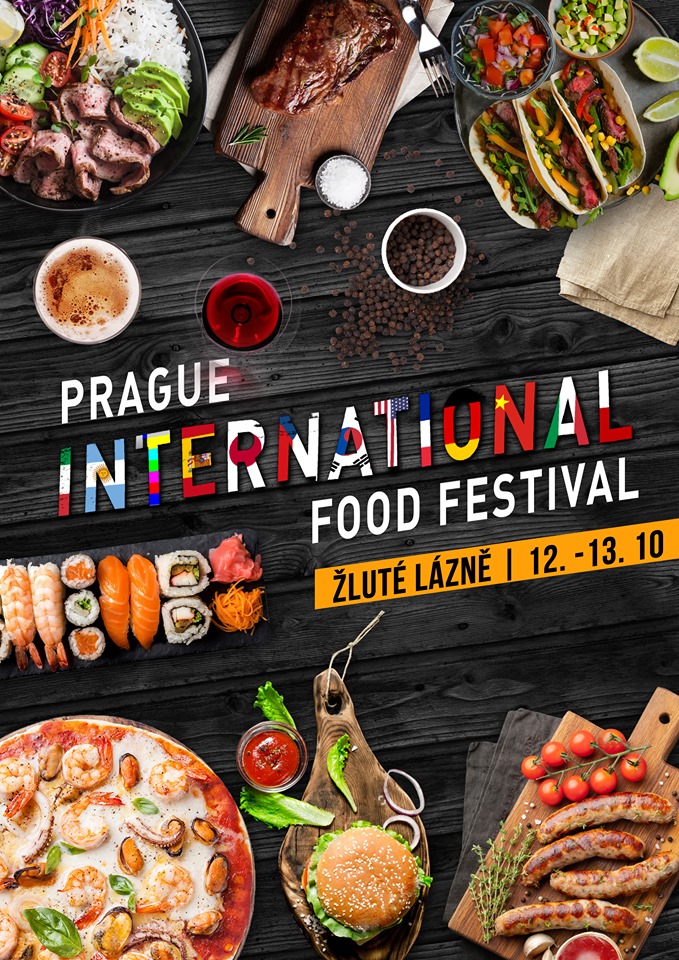
Prague police are preparing a security measurement due to the football match on Friday between the Czech Republic and England. The aim will be to ensure the smooth running of this event.
The measure will involve hundreds of police officers from the riot, criminal, transport and foreign service, anti-conflict team, special and regional riot units and last but not least, police officers with dogs and horses. As part of the measures, the police will supervise not only public order but also road safety and fluidity. The Eden Arena stadium will be open to fans at 18.45, and the match will start two hours later.
Czech Police officers will also be assisted by dozens of City Police officers, as part of their supervision of road traffic and public order. When preparing security measurements, Prague police will closely cooperate not only with the organizers but also with other entities affected by the measure.
Police officers will be reinforced by 11 colleagues from England who have personal knowledge of their football supporters and will mainly give them information.
The majority of English supporters are expected to stay in Prague for the whole weekend, so the service will be reinforced mainly in the centre, where police will deal with possible excesses.
Prague is worried about the collapse of traffic regarding around 300,000 people are coming at Prague’s Žofín today to say goodbye to Karel Gott.
The office of the government organizing the event of the funeral estimated initially one-third of the people that are expected. According to Jana Hrubého, Chief Operating Officer of Žofín Palace, it is realistic to satisfy about 50,000 people.
Already on Thursday afternoon, the first fans began gathering in front of the venue by the Vltava River, despite a ban in Prague against sleeping in public places.
People are guided through the park on Slovanský Island to the main entrance of the palace. Outside, Karel Gott’s songs are playing as well as in the grand hall on the first floor, where the coffin will be exhibited.
A place for flowers and no long-standing at the catafalque
There are three steps to the coffin in the great hall, on which people can place flowers. The movement of people will be controlled to reach as many people as possible. People leave the small hall towards the Mánes Gallery.
On Slovanský Island, about ten mobile toilets are available at the queue. People are also able to use the public restrooms in the building.
About 130 police officers are supervising the security, Prague rescuers and volunteers of the Czech Red Cross are on the spot.
“Based on our cooperation with the City of Prague, we have 25 volunteers on-site to monitor people who come to say goodbye to Karel Gott,” said Jaroslava Marková, director of the Czech Red Cross of Prague 1.
Czech singer Karel Gott died on the 1st of October before midnight. He was 80 years old.
Another three big events are happening today in Prague: the football game between the Czech Republic and England, the ongoing annual Signal Festival and the protest by the environmental group Extinction Rebellion.
View this post on Instagram
Sbohem, Mistře… #karelgott #sbohem #zofin
A post shared by Aleš Šnóbl (@alespraha) on
At the end of this year, O2 will shut down all public payphones, except those in the smaller municipalities. Out of the 3900 telephone booths currently in operation, 1150 remain in municipalities with up to 200 more inhabitants next year. It was confirmed by O2 spokeswoman Lucie Jungmannová this past Wednesday.
The reason for the interference is due to little or no calls from the booths; everyone has mobiles. “In recent years, coverage of the 4G mobile network, which is available in the Czech Republic territory at 96.9 percent, has risen significantly, making it one of the best in Europe. Most people use a mobile phone or a fixed-line, and phone boxes are gradually losing their meaning,” Lucie said, with some people calling less than once a month.
The operator will continue to operate the machines in locations where it is required by the Czech Telecommunication Office as part of the so-called universal service. Every year, the operator sets parameters for the size of the municipality, in which at least one booth will be placed. Another reason for the obligation to place a booth is a weak mobile signal. Loss of the municipality’s operation is then paid by the state to the operator. The subsidy is around 9000 CZK per machine per year.
In addition to the decreasing number of calls, the high demand for maintenance and the fight against vandalism is another reason for interference. Booths are the target of vandals rather than a place to call. Call revenues are thus far from covering maintenance and operating costs.
Interrupted payphones will be operational until December 31. Afterward, the supplier company gradually dismantles the instruments and boxes and ensures its ecological disposal. O2 also cooperates with the Bookstores project, where unused booths become small public libraries. This project was created with the help of the corporate O2 Foundation.
O2 operated most of the payphones at the turn of the century when over 30,000 booths were in operation. Since then, their numbers have been decreasing due to declining usage, an effect from the advent of mobile technology.
